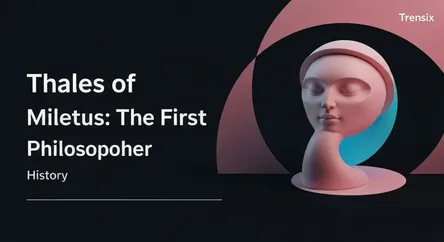History
Thales of Miletus: The First Philosopher

Discover Thales of Miletus, the ancient Greek thinker credited as the first philosopher and father of science for seeking natural explanations for the world.
What is it?
Thales of Miletus (c. 624–545 BCE) is widely regarded as the first philosopher in the Western tradition and the father of science. A key figure from the Greek city of Miletus in Ionia, he was the first known thinker to explain the natural world through observation and reason rather than mythology. His most famous philosophical position was that the originating principle of all nature was a single material substance: water. Beyond philosophy, Thales was an accomplished mathematician, credited with Thales's theorem, and an astronomer said to have famously predicted a solar eclipse.
Why is it trending?
Thales remains a perpetually relevant figure because his work represents the birth of rational inquiry. The core of his legacy is not the accuracy of his conclusions but his revolutionary method—the attempt to understand the universe through natural causes. This foundational shift from myth to reason is the starting point for all subsequent Western philosophy and science. He is consistently referenced in education and intellectual discussions about the origins of scientific thought. His approach of using observation to form testable hypotheses is a cornerstone of the modern scientific method, making his work timeless.
How does it affect people?
The legacy of Thales fundamentally shapes our modern world. His break from mythological explanations paved the way for the scientific method, which is the basis for all modern technology, medicine, and engineering. His application of deductive reasoning to geometry helped establish mathematics as a formal system of thought that is critical to countless fields today. By seeking to understand the cosmos as a predictable and knowable system, Thales initiated a tradition of inquiry that empowers humanity to solve problems and innovate. His influence is felt in every classroom and laboratory where rational thinking is used to understand the world.